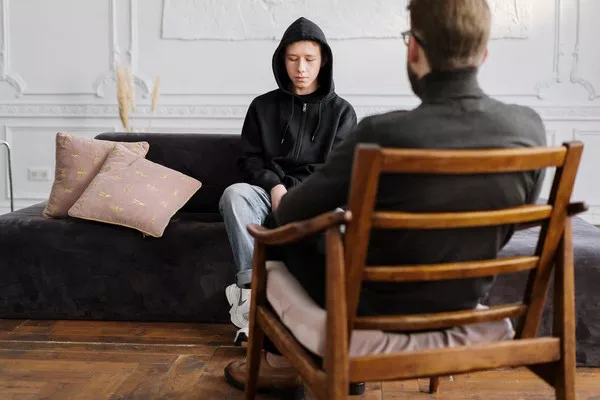SAD social anxiety disorder, also known as social phobia, is a type of anxiety disorder that specifically relates to fear or anxiety in social situations. It’s characterized by intense fear of being judged or scrutinized by others, often leading to avoidance of social interaction altogether. In this article, we’ll explore what SAD social anxiety disorder is, its symptoms, causes, and available treatment options.
Symptoms of SAD Social Anxiety Disorder
The symptoms of SAD social anxiety disorder can vary from person to person but often include:
- Fear of judgment or scrutiny
- Worrying excessively that others will negatively judge or scrutinize you.
- Fearful of saying or doing something that might be perceived as embarrassing.
- Avoidance of social situations
- Feelings of discomfort or anxiety in situations involving meeting new people or interacting with strangers.
- An inclination towards avoiding social events.
- Physical Symptoms
- Increased heart rate, sweating, trembling or shaking.
- Nausea or stomach pain.
- Difficulty breathing or a sensation of choking.
Causes of SAD Social Anxiety Disorder
While the exact causes of SAD social anxiety disorder are not fully understood, some factors that may contribute to its development include:
- Genetics
- Individuals with a family history of anxiety disorders may be more susceptible to developing SAD social anxiety disorder.
- Environmental Factors
- Experiencing traumatic events, such as bullying, childhood abuse, or neglect, can increase the likelihood of developing SAD social anxiety disorder.
- Brain Chemistry
- Chemical imbalances in the brain, including neurotransmitters like serotonin, dopamine, and GABA, which regulate mood and emotions, may play a role in SAD social anxiety disorder.
Treatment Options for SAD Social Anxiety Disorder
Fortunately, SAD social anxiety disorder is treatable through a variety of approaches, including:
- Therapy
- Cognitive-behavioral therapy (CBT) is often used to treat SAD social anxiety disorder.
- Exposure therapy, which involves gradually exposing individuals to feared social situations, can also be effective.
- Medication
- Antidepressants and anti-anxiety medications may be prescribed to help manage symptoms of SAD social anxiety disorder.
- Lifestyle Changes
- Engaging in regular exercise, practicing stress-management techniques like yoga or meditation, and avoiding substances like caffeine and alcohol may all help alleviate symptoms of SAD social anxiety disorder.
Coping Strategies for SAD Social Anxiety Disorder
In addition to seeking professional treatment, there are several coping strategies that individuals with SAD social anxiety disorder can use to manage their symptoms, including:
- Mindfulness and Relaxation Techniques
- Practicing relaxation techniques like deep breathing, visualization, or progressive muscle relaxation can help reduce anxiety and promote calmness.
- Self-Compassion
- Being kind and understanding towards yourself can help reduce feelings of shame and self-criticism.
- Seeking Support from Loved Ones
- Talking to friends and family members about your experiences can provide emotional support and validation.
Seeking Professional Help for SAD Social Anxiety Disorder
If you or someone you know is experiencing symptoms of SAD social anxiety disorder, it is crucial to seek professional help. A trained mental health professional can provide an accurate diagnosis and develop a personalized treatment plan that addresses the individual’s specific needs.
Some options for seeking professional help include:
- Primary Care Physician
- Start by discussing your symptoms with a primary care physician who can provide a referral to a mental health specialist.
- Mental Health Specialist
- Psychologists and psychiatrists are trained professionals who specialize in treating anxiety disorders like SAD social anxiety disorder.
- Online Therapy
- Online therapy platforms offer convenient and accessible options for individuals who may not have access to in-person therapy.
Conclusion:
SAD social anxiety disorder is a real and often debilitating condition that affects millions of people worldwide. However, it is important to remember that help is available and that there are many effective treatment options for managing its symptoms. By seeking professional treatment, practicing coping strategies, and making lifestyle changes, individuals with SAD social anxiety disorder can learn to overcome their fears and live their lives to the fullest.
Related Topics:





























